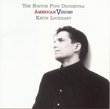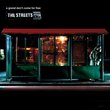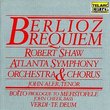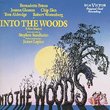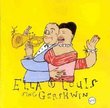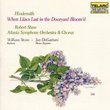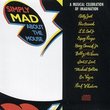| All Artists: Kenneth Schermerhorn Title: Villa-Lobos: Ch˘ros Nos. 8 and 9 Members Wishing: 0 Total Copies: 0 Label: Naxos Original Release Date: 1/1/2001 Re-Release Date: 10/16/2001 Genre: Classical Styles: Forms & Genres, Concertos, Historical Periods, Modern, 20th, & 21st Century, Instruments, Keyboard, Symphonies Number of Discs: 1 SwapaCD Credits: 1 UPC: 747313524129 |
Search - Kenneth Schermerhorn :: Villa-Lobos: Ch˘ros Nos. 8 and 9
 | Kenneth Schermerhorn Villa-Lobos: Ch˘ros Nos. 8 and 9 Genre: Classical
Villa-Lobos wrote 14 Chôros, substantial works rooted in Brazilian popular music. As you might expect, the Eighth and Ninth of the series are drenched in exotic tonal colors and alive with exciting rhythms. No. 8 feat... more » |
Larger Image |
CD DetailsSynopsis
Amazon.com Villa-Lobos wrote 14 Chôros, substantial works rooted in Brazilian popular music. As you might expect, the Eighth and Ninth of the series are drenched in exotic tonal colors and alive with exciting rhythms. No. 8 features an array of conventional and unconventional percussion instruments including rattles, scrapers, and the caracaxa, which opens the piece. It's full of lively tunes as well and has an important piano part. No. 9 was composed four years later, in 1929. It opens with a riot of color, tapering down to a fascinating section for brass and winds over an obsessively repeated rhythm and a bassoon solo that's a twin to the start of Stravinsky's Rite of Spring. Like its predecessor, Chôros No. 9 is an endlessly enjoyable work, and it gets a bang-up performance from Schermerhorn and the Hong Kong musicians. Their command of the idiom makes you swear you're hearing a Brazilian band. Once available on the Marco Polo label, it shouldn't be missed in this Naxos budget re-release. --Dan Davis Similarly Requested CDs
|
CD ReviewsAn exceptionally brave performance Wildfire | UK | 07/17/2002 (5 out of 5 stars) "Until recently this performance was available on a Marco Polo full-priced CD. At Naxos prices it is exceptional value for money so it gets the 5 stars. Both these Choros are among Villa-Lobos' most difficult works and it is to the credit of Schermerhorn that he keeps the orchestra under control at all, let alone so well. There are moments when it seems to teeter on the edge of fragmentation but thankfully all goes well and, in some ways, this adds to the thrill of the performance! The recording, made in the early eighties, is excellent and well balanced. However, I would not recommend it to someone approaching Villa-Lobos for the first time. Most of his orchestral Choros are complex affairs with rhythms and melodic interplays that (while not being Avant-Garde) challenge ones musical sensibilities and this one does so to the limit. If you're brave, fine! But otherwise I would recommend the smaller Choros or, for orchestral works, the Symphonies, Amazonia, Forest of the Amazon or The Discovery of Brazil." Exotic Villa Lobos from his french years Todd Montgomery | Wilmore, KY USA | 04/06/2002 (5 out of 5 stars) "Even before the Rite of Spring-ish bassoon lines in choros 9, the influence of Stravinsky and others working in France during the time Villa-Lobos was there can be heard strongly. These pieces still manage to sound quite original because of the immense percussion, and of course the choros rythyms. These are colorful, exciting, and typically brazilian in the composer's style. Although I don't know of other recordings of this to compare it to, the performance sounds magnificent. My only complaint is that the whole cd is just over forty minutes in length. I keep wanting more!" Brazilian exotica A. J. Finch | Malaysia | 06/05/2007 (5 out of 5 stars) "The choros was - and possibly still is - a popular form for street musicians in Rio de Janeiro which inspired Villa-Lobos to write music in a characteristic Brazilian idiom. It is hard to imagine these works, with their need for a full orchestra, being played in the streets of any city but the combination of percussion and complex rhythms certainly evoke an image of the variety of ethnic origins which form the culture of Brazil. I have not heard these pieces before and so have little to compare them with. Certainly the Hong Kong P.O. enters enthusiastically into the spirit of the music - perhaps someone more well-versed with Brazilian music would be better placed to comment on the authenticity of the performance; to me it seems to convey very well the mood of tropical South America. I would recommend this CD to anyone with an interest in 20th century music, particularly that of Stravinsky, who might well have written works like this if he had spent time in Brazil."
|

 Track Listings (2) - Disc #1
Track Listings (2) - Disc #1